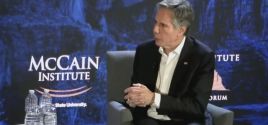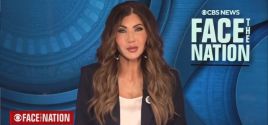Poll reveals how trust in BBC has plummetedJulian GloverThe Guardian Jul. 29, 2007 |
Popular 
Dershowitz to Launch 'Massive Offensive Lawfare' Against 'Anti-Semitic' Pro-Palestine Protesters

"We Were There First and Foremost for Our Country of Israel," UNC Frat Bro Tells Fox News

Blinken Blames Social Media for Israel Losing PR War; Romney Agrees, Confirms TikTok Ban is to Help Israel

South Dakota Gov. Kristi Noem Admits She Did Not Meet With Kim Jong Un As Her Book Claimed

House Passes 'Antisemitism Awareness Act' to Silence Criticism of Israel as Hate Speech
 Public trust in the BBC has fallen sharply in the wake of the scandal involving fake phone-in competitions on high-profile programmes and wrongly edited footage of the Queen, a Guardian/ICM poll shows today. The poll also reveals a wider crisis of public confidence in the broadcasting industry as a whole, with viewers strongly sceptical of what they see on television, even when they are told the scenes are real. Fifty-nine per cent of those questioned say they now trust the BBC less than before. Only 37% say their opinion has remained unchanged, despite the BBC's admission that it had made mistakes and would ensure that they were not repeated. Older viewers in particular have lost faith, with 67% of over-65s saying that they now trust the BBC less than they used to. Last week Sir Michael Lyons, chairman of the BBC Trust, said he wanted the corporation to become "a different place" within a year, rebuilding the reputation of the licence fee-funded organisation. The BBC has long-prided itself on its reputation for accuracy and honesty, but the poll suggests that viewers think its channels are no more honest than those of commercial rivals such as ITV and BSkyB. Asked whether they think the BBC is more likely to tell the truth than its rivals, only 37% agree. A clear majority of viewers and listeners - 58% - said they thought that there was no difference between the BBC and other channels. The organisation, which promises that it aims to be "independent, impartial and honest", has been battling to defend its reputation for accuracy after a series of embarrassing admissions. Heads rolled at the BBC after it was revealed that Children in Need, Comic Relief and Sport Relief had all featured fake competition winners and that during an episode of Blue Peter a studio guest had posed as a competition winner. The BBC also had to issue an apology for a misleadingly edited BBC1 trailer which wrongly implied that the Queen had stormed out of a sitting with the photographer Annie Leibovitz. Last week its director general, Mark Thompson, said the organisation had experienced "a rude awakening". He promised to send staff on retraining courses to restore a culture of honesty. Public concern about the reliability of what they see on screen also runs more widely than the BBC. A large majority of those questioned - 74% - agreed that many things on television are made up, even when they look real. Only 22% of viewers said that they trusted what they saw. Some in the industry have defended fictitious claims in some supposedly factual programmes, such as Gordon Ramsay's The F Word and Born Survivor, on the grounds that the shows are intended as entertainment. But today's poll shows that the public do want to be shown the truth, at least by the BBC. Asked whether they think that the BBC's job should be to entertain, even if it means dishonesty at times, only 31% of viewers agree. Most - 67% - do not, suggesting that there is strong public backing for the corporation's attempt to impose clear values on its output. Only younger viewers, those under 24, are more sympathetic to the idea that entertainment is more important than telling the truth: 46% agree, against 54% who do not. · ICM Research interviewed a random sample of 1,005 adults aged over 18 by telephone on July 20-22. Interviews were conducted across the country and the results have been weighted to the profile of all adults. ICM is a member of the British Polling Council and abides by its rules. |



